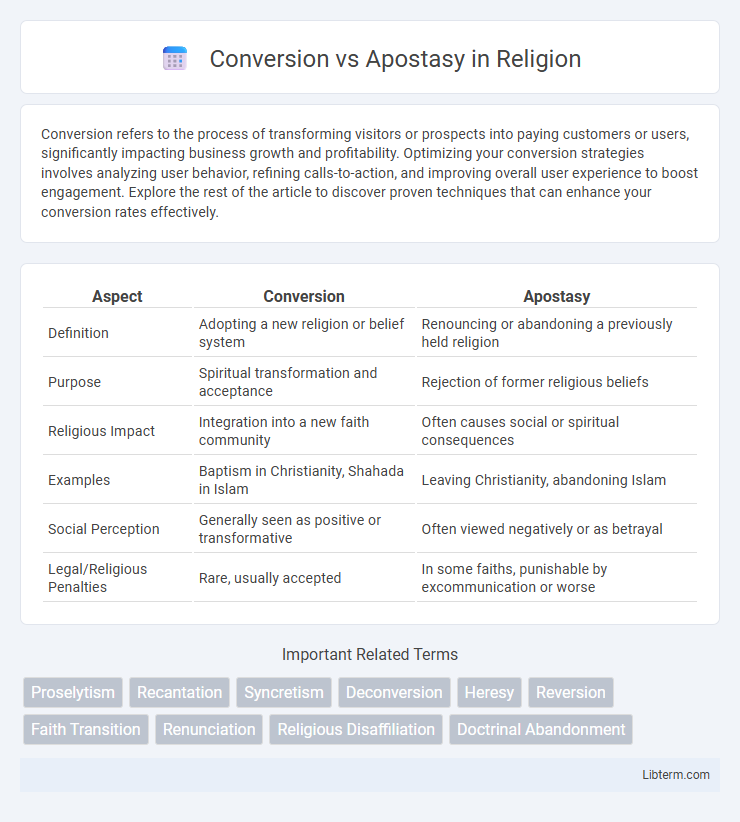Conversion refers to the process of transforming visitors or prospects into paying customers or users, significantly impacting business growth and profitability. Optimizing your conversion strategies involves analyzing user behavior, refining calls-to-action, and improving overall user experience to boost engagement. Explore the rest of the article to discover proven techniques that can enhance your conversion rates effectively.
Table of Comparison
| Aspect | Conversion | Apostasy |
|---|---|---|
| Definition | Adopting a new religion or belief system | Renouncing or abandoning a previously held religion |
| Purpose | Spiritual transformation and acceptance | Rejection of former religious beliefs |
| Religious Impact | Integration into a new faith community | Often causes social or spiritual consequences |
| Examples | Baptism in Christianity, Shahada in Islam | Leaving Christianity, abandoning Islam |
| Social Perception | Generally seen as positive or transformative | Often viewed negatively or as betrayal |
| Legal/Religious Penalties | Rare, usually accepted | In some faiths, punishable by excommunication or worse |
Understanding Conversion: Definition and Context
Conversion refers to the process of adopting a new religious belief or faith system, often involving a significant personal or spiritual transformation. It generally implies a voluntary and conscious decision to embrace new religious doctrines, practices, and community affiliations, which can occur in various cultural and historical contexts. Understanding conversion requires recognizing its multifaceted nature, encompassing psychological, social, and theological dimensions that influence an individual's faith journey.
The Meaning of Apostasy in Various Religions
Apostasy signifies the formal abandonment or renunciation of a religion, often viewed differently across religious traditions. In Christianity, apostasy entails the rejection of core doctrines and can lead to excommunication, whereas Islam considers apostasy (riddah) a grave sin with severe social and legal consequences in some interpretations. Hinduism perceives apostasy less rigidly, emphasizing personal spiritual paths over strict adherence, while Judaism regards apostasy as leaving the covenant with God, impacting communal and religious identity.
Historical Perspectives: Conversion Through the Ages
Conversion through the ages has been a pivotal phenomenon shaping religious landscapes and cultural identities worldwide. Historical perspectives reveal patterns of voluntary and forced conversions, influenced by political power shifts, missionary activities, and social dynamics across civilizations such as the Roman Empire's adoption of Christianity and the spread of Islam during the Caliphates. These conversions often entailed complex negotiations of faith, identity, and community belonging, contrasting with apostasy, which historically faced social ostracism and legal repercussions in many societies.
Apostasy Laws and Legal Implications
Apostasy laws vary widely across countries, with some imposing severe penalties, including imprisonment, fines, or even death for renouncing a religion, particularly in Islamic states like Saudi Arabia, Iran, and Pakistan. These laws impact freedoms of religion and expression, often leading to human rights concerns and international criticism. Legal implications include restrictions on civil rights, such as marriage, inheritance, and custody, creating significant social and legal challenges for individuals who convert away from their birth religion.
Motivations Behind Religious Conversion
Motivations behind religious conversion often include psychological needs for identity, community belonging, and spiritual fulfillment, whereas apostasy is frequently driven by disillusionment, ideological conflict, or moral disagreement with previous beliefs. Conversion can be influenced by social pressure, interfaith marriage, or life-changing experiences, highlighting a proactive search for meaning and belonging. Apostasy reflects a rejection of prior religious identity, often accompanied by critical re-evaluation of doctrine and personal values.
Social and Cultural Impacts of Apostasy
Apostasy often triggers significant social repercussions, including ostracism, discrimination, and strained family relationships, deeply affecting individuals' social standing within their communities. Culturally, apostasy can challenge traditional norms and religious identities, sometimes leading to heightened tensions or conflicts within society. These impacts underscore the profound influence of religious adherence on social cohesion and cultural continuity.
Psychological Aspects: Why People Convert or Leave Faith
Psychological motivations behind conversion often include the human desire for identity, belonging, and meaning, which religion can fulfill by providing a structured worldview and community support. Apostasy may stem from cognitive dissonance when beliefs clash with personal experiences or values, leading individuals to seek coherence and authenticity outside their original faith. Both conversion and departure involve complex emotional and mental processes influenced by social pressures, existential crises, and the search for self-understanding.
Conversion vs Apostasy: Key Differences
Conversion involves adopting new religious beliefs or practices, often signifying a voluntary and positive spiritual transformation. Apostasy refers to the formal renunciation or abandonment of a previously held faith, typically viewed negatively within religious communities. Key differences include intention, social acceptance, and doctrinal implications, with conversion fostering inclusion and apostasy often leading to exclusion or censure.
Contemporary Case Studies: Stories of Conversion and Apostasy
Contemporary case studies of conversion and apostasy reveal complex personal journeys influenced by cultural, social, and psychological factors. Examples include individuals embracing new faiths in multicultural societies and those renouncing their religion due to ideological conflicts or social pressures. These stories highlight the dynamic nature of religious identity in the modern world, often involving profound shifts in belief and community affiliation.
The Future of Religious Freedom and Choice
Conversion and apostasy remain central issues in the discourse on the future of religious freedom and choice, as they directly challenge entrenched social, legal, and cultural norms worldwide. Legal frameworks supporting the right to convert or renounce faith vary significantly, with some countries imposing penalties, while others enshrine these rights in constitutional protections, shaping international human rights policies and advocacy efforts. The evolving global emphasis on individual autonomy and pluralism is driving reforms aimed at safeguarding freedom of conscience, fostering environments where religious choice is respected without fear of persecution or discrimination.
Conversion Infographic

 libterm.com
libterm.com